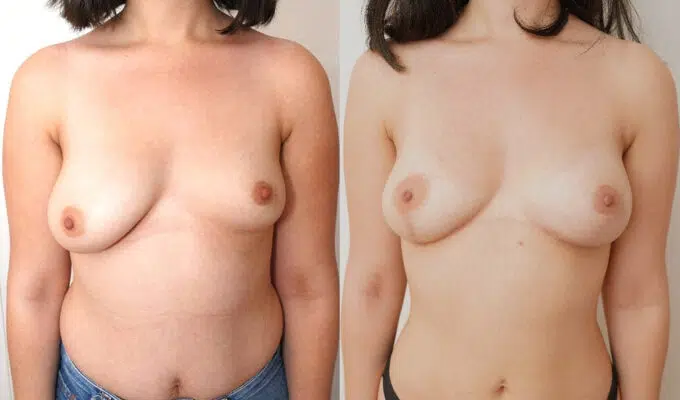
Breast asymmetry / breast lipofilling
Correction of breast asymmetry by breast ptosis correction (breast lift) and left breast augmentation by fat injection
Breast asymmetry is common among women, ranging from subtle to pronounced differences that can cause significant aesthetic discomfort. Simple cosmetic surgery techniques can achieve symmetrical and harmonious breasts.

A difference in volume between the two breasts is present in the majority of women and is usually not alarming. However, when the asymmetry is significant (at least one cup size difference), it can become a challenge to find well-fitting bras and a source of aesthetic concern. This condition is referred to as breast asymmetry.
Breast asymmetry may involve differences in breast shape, volume, and/or the position of the nipples. It can be congenital, develop during pre-puberty, or arise following pregnancy, breastfeeding, or weight fluctuations.
Congenital breast malformation refers to breast asymmetry that becomes apparent towards the end of adolescence, after breast development is complete. This asymmetry can stem from two main reasons:
This anomaly affects one breast and is characterized by a double-fold under the breast, an oversized areola, and a tubular-shaped breast development.
Less understood and more common in males, Poland syndrome involves an underdevelopment or an absence of the large chest muscle on one side of the chest. In females, this results in breast asymmetry. The anomaly can affect either the right or left side of the body, with the right side being more frequently affected.
During pregnancy, breasts undergo changes. Typically, they return to their original shape about 1 year after childbirth. However, some women develop asymmetry due to the “empty breast” effect (loss of mass and sagging), which can be caused or exacerbated by breastfeeding.
Sudden breast asymmetry is characterized by a noticeable difference in breast size that appears suddenly. This abrupt asymmetry can be caused by the presence of a cyst, abscess, or mass (malignant or benign). It is essential to consult a specialist to determine the cause and appropriate treatment.
At menopause, hormonal secretion stops, and mammary glands atrophy. Generally, there is no impact on breast volume as the loss is compensated for by adipose tissue (fat). However, it can happen that one breast is less filled than the other. This breast asymmetry, if it becomes a concern, can certainly be corrected.
In cases of significant trauma (accident, burn) or breast cancer, surgical interventions used to address the issue can often result in breast asymmetry. This is particularly the case following mastectomy, breast injury, or reconstructive surgery after a major accident.
In some cases, differences in volume, shape, or position of the nipples may be observed.
There are different types of breast asymmetry, including:
The position of the nipples may vary, contributing to an aesthetically displeasing appearance of the breasts. Simple cosmetic surgery techniques can reposition the nipples to the same level with very discreet scars.
The techniques for correcting breast asymmetry vary depending on the type. Common cosmetic breast surgery techniques include:
Used when one breast is larger than the other, reducing breast volume while correcting ptosis by lifting the breast simultaneously.
Used when both breasts have the same volume but are not at the same level (one breast higher or lower than the other). The lower breast is lifted to match the higher one.
Used when one breast is smaller than the other, involving the placement of breast implants or fat injection to increase breast volume.
The procedure for correcting breast asymmetry varies depending on the technique used.
For breast reduction, the surgery is performed under general anesthesia in the operating room and typically lasts up to 3 hours. The surgeon makes two incisions: one around the areola and another vertically from the areola to the fold beneath the breast. Excess skin and/or glandular tissue are removed, and the skin, nipple, and areola are repositioned. An overnight stay at the clinic is recommended.
In the case of breast lift (mastopexy), the procedure can be performed on an outpatient basis, allowing for return home the same evening. Dr. Benjamin Sarfati utilizes breast lifting techniques with or without implants that do not require drains.
For breast augmentation, the surgery is performed on an outpatient basis or under local anesthesia, depending on the technique used (implants, fat transfer, or Mia). The procedure typically lasts about 1.5 hours and may require a clinic stay.
It’s important to note that prior to any surgery for correcting breast asymmetry, a mammogram and ultrasound are necessary.
Recovery after breast asymmetry correction is straightforward. There may be swelling post-surgery that typically resolves within a few weeks. Generally, patients can expect 4 to 5 days of downtime following the procedure. The sutures used are absorbable, so there is no need to remove them. Patients can usually shower the day after surgery.
The goal of breast surgery, regardless of the technique used, is to achieve symmetrical breasts in terms of volume, shape, position, and overall appearance. Ensuring a boost in self-confidence, the contour should harmonize with the patient’s morphology and align with their desires.
There are three types of scars depending on the procedure performed:
Located between the brown color of the areola and the skin color, these scars are the least visible and do not affect nipple sensitivity. Another advantage is that they do not interfere with future breastfeeding.
Primarily used in more complex surgeries, the anchor-shaped scar is more visible but provides better results for the practitioner during implant placement.
Mostly used in implant placement, this scar is only visible when the patient is lying on her back. When standing, the scar is hidden under the breast fold. This minimally invasive technique allows the implant to be inserted directly through the back of the breast, preserving nipple sensitivity and the ability to breastfeed.
The cost of breast asymmetry correction varies depending on the technique used. Following the initial consultation, Dr. Sarfati will provide a detailed quote.
This surgery may be covered by health insurance in cases of significant asymmetry requiring compensation in the bra, or in cases of malformation syndromes such as tuberous breasts or Poland syndrome. It may also be reimbursed if more than 300g per breast is removed or if the initial cup size is below A (breast agenesis).
During your initial consultation, Dr. Sarfati will advise you on the necessary steps to take before the procedure based on the technique used. After ensuring there are no contraindications, it is recommended to stop any anticoagulant and anti-inflammatory medications 5 days before surgery, and to cease smoking at least 6 weeks prior to the procedure.
The results of breast asymmetry correction surgery are immediately visible. However, it may take several months to appreciate the final results as swelling subsides.
If breast surgery is performed due to a medically recognized condition (such as cancer, Poland syndrome, etc.), it may be covered by insurance.
With careful consideration, breast symmetry correction can be performed once breast development is complete, typically around 17 years of age.

DOCTOR BENJAMIN SARFATI
Specialist in breast surgery and intimate surgery
Make an appointment
Make an appointment in person or by teleconsultation :